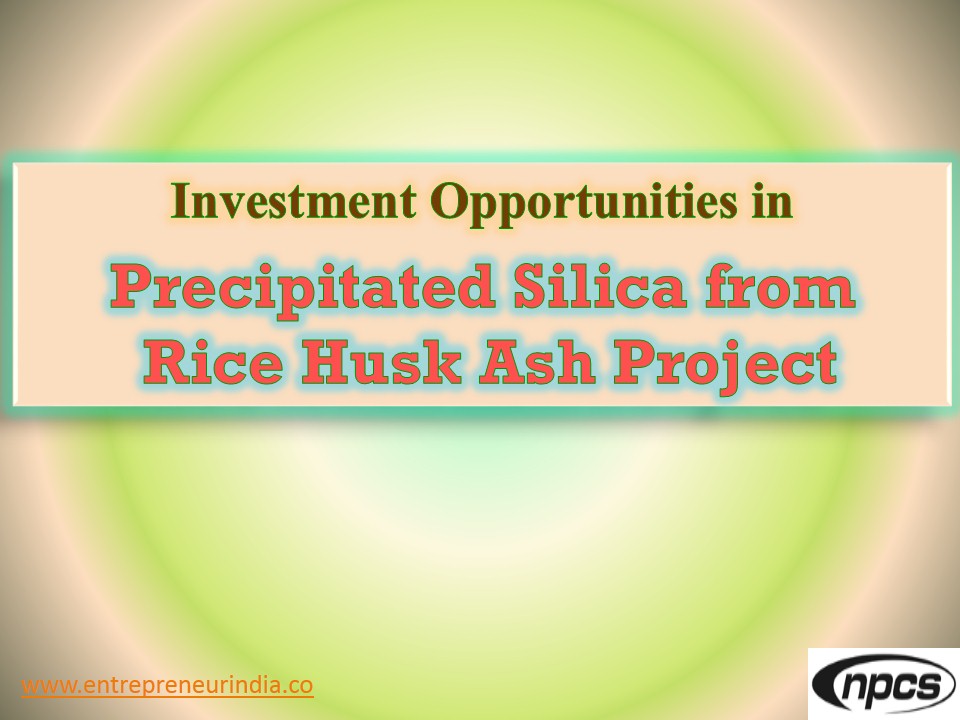
India’s industrial landscape is evolving with a sharp focus on sustainability, value addition, and import substitution. One of the most promising areas gaining momentum is the production of Investment in Precipitated Silica from rice husk ash. With abundant agricultural residue available and increasing demand across rubber, pharmaceuticals, cosmetics, food, and construction industries, this venture presents a viable and profitable business opportunity for entrepreneurs and investors.
By converting agro-waste into high-value industrial material, this project not only contributes to the circular economy but also strengthens India’s position in the global specialty chemicals market. With a well-structured business model, clear process flow, and market understanding, investing in precipitated silica from rice husk ash can offer strong returns and long-term growth.
Contents
- 1 Understanding Precipitated Silica and Its Market
- 2 Process Overview: From Rice Husk Ash to Precipitated Silica
- 3 Machinery and Infrastructure Requirements
- 4 Licenses and Regulatory Approvals
- 5 Market Potential and Applications
- 6 SWOT Analysis of the Project
- 7 Environmental Benefits and Sustainability
- 8 Government Support and Financial Assistance
- 9 Steps to Start Investment in Precipitated Silica Manufacturing
- 10 Conclusion
Understanding Precipitated Silica and Its Market
Precipitated silica is a form of synthetic amorphous silicon dioxide (SiO?) with a wide range of industrial applications. It is known for its high porosity, excellent absorption capacity, and superior reinforcing properties. Typically, it is used as:
-
A reinforcing agent in rubber (especially in tires)
-
A thickening agent in toothpaste and cosmetics
-
An anti-caking and carrier agent in food and feed additives
-
A polishing agent and moisture absorber in various products
Global demand for precipitated silica is growing due to the rise in green tires, cleaner food processing, and eco-friendly industrial practices. India currently imports a significant portion of its precipitated silica needs. Hence, there is a pressing need to develop indigenous production capacities.
See More : CA Firms & Chartered Accountants
Why Rice Husk Ash?
Rice husk, a byproduct of paddy milling, constitutes nearly 20% of the rice grain weight. When burned, it leaves behind rice husk ash (RHA), which contains 80–95% amorphous silica. This makes it an ideal raw material for silica extraction. India, being one of the largest rice-producing nations, generates over 20 million tonnes of rice husk annually.
Using rice husk ash for precipitated silica production ensures low-cost raw material availability, reduces environmental pollution, and creates a sustainable value chain from waste to wealth.
Process Overview: From Rice Husk Ash to Precipitated Silica
The manufacturing of precipitated silica from RHA involves chemical treatment, filtration, precipitation, washing, and drying. The key stages include:
1. Ash Collection and Purification
First, rice husk is burned under controlled conditions to produce amorphous rice husk ash. This ash is collected and screened to remove impurities like unburned carbon, sand, or metallic content.
2. Extraction of Silica
The purified ash is treated with an alkali solution (usually sodium hydroxide) under heat and pressure. This process dissolves silica from the ash to form sodium silicate solution.
Reaction:
SiO? (from ash) + 2NaOH ? Na?SiO? (sodium silicate) + H?O
3. Precipitation
The sodium silicate solution is then treated with an acid (commonly sulfuric acid) to precipitate silica. The process parameters like pH, temperature, and reaction rate affect particle size and quality.
Reaction:
Na?SiO? + H?SO? ? SiO?? (precipitated) + Na?SO? + H?O
4. Filtration and Washing
The precipitated silica is filtered to remove the by-products and thoroughly washed to eliminate residual salts.
5. Drying and Pulverizing
The wet silica is dried in rotary or spray dryers and then pulverized to obtain fine, white precipitated silica powder.
Machinery and Infrastructure Requirements
Setting up a precipitated silica manufacturing plant involves the following essential equipment:
-
Ash calcination furnace
-
Reactors for alkaline extraction and acid precipitation
-
Filtration units (plate filters or filter press)
-
Drying system (spray dryer or rotary dryer)
-
Pulverizer and packaging line
-
Water treatment and effluent treatment plant (ETP)
The infrastructure should include a production shed, raw material storage, finished goods warehouse, quality control lab, power backup, and pollution control systems. Depending on the scale, an initial investment of ?3 to ?15 crore may be required for a small to medium-scale unit.
Licenses and Regulatory Approvals
To establish a precipitated silica plant in India, entrepreneurs must secure the following:
-
MSME Udyam Registration
-
Factory license from the local Directorate of Factories
-
NOC from State Pollution Control Board (SPCB)
-
GST registration
-
Import-export license (if planning to export)
-
Hazardous waste management compliance (for ash handling)
For food-grade or pharmaceutical-grade silica, FSSAI or drug license certifications may be required.
Market Potential and Applications
Precipitated silica serves a wide array of industries, and demand is rising steadily due to its versatile properties:
1. Rubber and Tire Industry
Used as a reinforcing filler in radial tires and rubber soles, precipitated silica enhances grip, rolling resistance, and durability. The global shift towards fuel-efficient, low-emission tires is fueling demand.
2. Food and Feed Additives
In powdered food items, it acts as an anti-caking agent and carrier. It is widely used in spices, powdered milk, seasonings, and cattle feed.
3. Pharmaceuticals and Cosmetics
In tablets and capsules, it serves as a disintegrant and flow agent. It is also used in toothpaste, face powders, and other personal care products due to its absorbent nature.
4. Paints and Coatings
Precipitated silica improves thickening, matting, and anti-settling properties in paints and coatings, helping achieve better texture and shelf life.
5. Agriculture and Agrochemicals
It is used as a carrier for insecticides and fertilizers, improving dispersion and handling.
India’s current demand for precipitated silica exceeds 150,000 tonnes per annum and is expected to grow at over 8% CAGR. With rising concerns around sustainability and import substitution, domestic manufacturers stand to benefit immensely.
SWOT Analysis of the Project
Strengths
-
Abundant raw material (rice husk) availability
-
Low production cost and high-value product
-
Import substitution potential
-
Strong multi-industry demand
Weaknesses
-
Initial technology and setup cost
-
Requires process optimization to meet quality norms
-
Dependence on consistent supply of quality ash
Opportunities
-
Rising demand in green tires and clean-label food
-
Export potential in Europe, Southeast Asia, and Africa
-
Scope for value-added silica derivatives (e.g., fumed silica)
Threats
-
Competition from established global brands
-
Volatility in rice husk ash supply during lean seasons
-
Environmental compliance and disposal norms
Environmental Benefits and Sustainability
Using rice husk ash for Investment in Precipitated Silica production helps reduce open burning of agro-waste and associated air pollution. It transforms agricultural residue into a clean, eco-friendly industrial material. Moreover, the process has:
-
Low carbon footprint
-
Minimal use of non-renewable resources
-
Reduced water pollution with proper ETP
Entrepreneurs can also obtain carbon credits and sustainability certifications, enhancing brand appeal and investor interest.
Government Support and Financial Assistance
The Government of India and state agencies offer multiple schemes to support such agro-waste-based projects:
-
MSME Credit Guarantee Scheme (CGTMSE) – For collateral-free loans
-
Technology Upgradation Fund (TUF) – For machinery purchase
-
National Mission on Sustainable Agriculture (NMSA) – For agri-waste valorization
-
Subsidies under Startup India and PMEGP – For new units
-
Export Promotion Schemes (MEIS/RODTEP) – For global markets
Additionally, financial institutions like SIDBI and NABARD extend project-based term loans and working capital finance.
Steps to Start Investment in Precipitated Silica Manufacturing
-
Feasibility Study: Analyze raw material availability, target markets, and break-even analysis.
-
Business Plan: Prepare a detailed DPR including machinery, plant layout, cost estimation, ROI, and marketing strategy.
-
Land and Registration: Choose location (preferably near rice mills or industrial clusters) and complete legal formalities.
-
Finance Arrangement: Approach banks or investors for capital.
-
Technology and Machinery: Finalize suppliers and set up plant.
-
Recruitment and Training: Hire technical staff, chemists, and workers.
-
Production and Quality Control: Begin trial production and set quality parameters.
-
Sales and Distribution: Connect with B2B buyers, distributors, and export agents.
See More : Architects Directory
Conclusion
The project of manufacturing Investment in Precipitated Silica from rice husk ash is a prime example of turning waste into wealth. It aligns with India’s goals of Atmanirbhar Bharat, green manufacturing, and rural empowerment. With the right mix of planning, investment, and execution, entrepreneurs can build a sustainable and scalable business.
This venture not only creates value from agricultural residue but also opens up global market opportunities in diverse sectors. For forward-thinking investors and startup founders, this project offers an ideal blend of profitability, innovation, and environmental stewardship.














